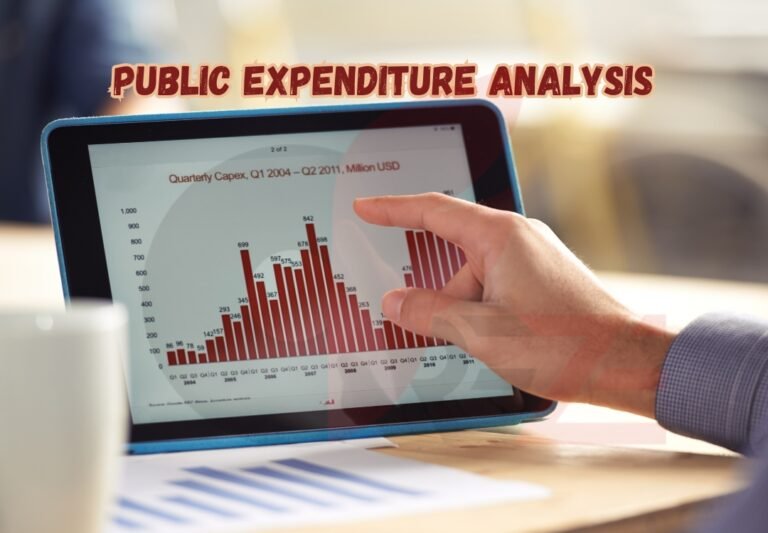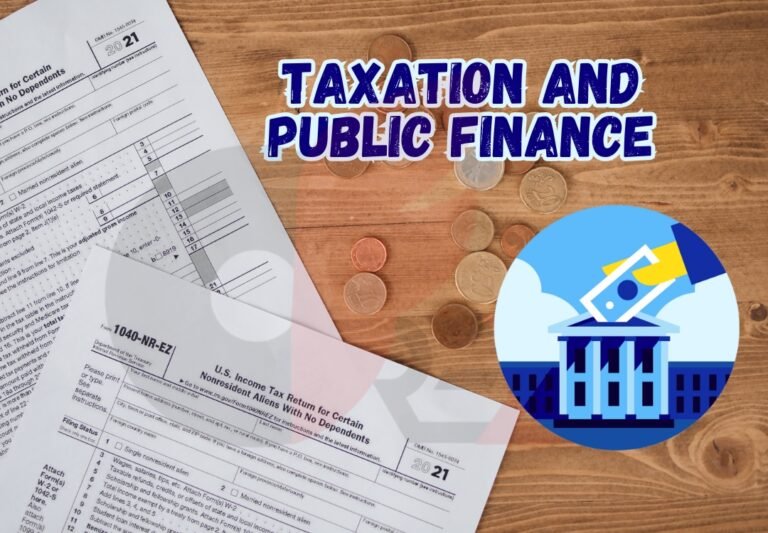How Public Sector Accounting Drives Government Accountability
Explore how Public Sector Accounting plays a crucial role in driving government accountability. This comprehensive guide delves into the importance of Public Sector Accounting, examining how accurate financial reporting, transparent budgeting, and effective resource management contribute to sound governance and fiscal responsibility.

Learn about the significance of International Public Sector Accounting Standards (IPSAS) in fostering global consistency, as well as how technological innovations like AI, blockchain, and real-time financial systems are transforming public sector practices. From preventing financial mismanagement to ensuring policy decisions are data-driven, this article explores the multifaceted role of Public Sector Accounting in enhancing governmental transparency, maintaining financial control, and improving public trust. Whether you’re a policymaker, public servant, or citizen, understanding the mechanics behind Public Sector Accounting is key to recognizing its value in promoting economic stability, government efficiency, and accountability at all levels.
Public Sector Accounting Introduction
Governments, at all levels, play a vital role in shaping the lives of citizens through policies, services, and the management of public resources. But with great responsibility comes the need for accountability. Public Sector Accounting is the system that ensures this accountability by enabling governments to manage, track, and report on their financial activities transparently. In essence, it is the backbone of effective governance.
At the heart of Public Sector Accounting is the importance of Public Sector Accounting in ensuring transparency, efficiency, and trust in government operations. Citizens must feel confident that their taxes are being used wisely and that public funds are being allocated effectively. This is where the role of Public Sector Accounting becomes indispensable. It is through sound accounting practices that governments provide financial information, manage resources, and hold themselves accountable to the public.
In this blog post, we will delve into how Public Sector Accounting directly drives government accountability, the significance of adhering to accounting standards, and how it fosters trust and transparency. We will also explore how accounting systems serve as tools for curbing corruption, improving public policy, and ensuring the responsible use of public funds. As we move through the sections, you’ll understand why Public Sector Accounting is not just about balancing books—it is about promoting a governance system that works for the people.
The Core Principles of Public Sector Accounting
Public Sector Accounting is rooted in a framework of key principles that ensure financial integrity, transparency, and accountability. These principles guide how governments handle taxpayer money, allocate resources, and report on public finances. Let’s explore these principles and understand their crucial role in ensuring that public sector operations remain efficient and trustworthy.
-
Foundations of Public Sector Accounting Practices
At its core, Public Sector Accounting involves the systematic recording, classification, and reporting of financial transactions in the public sector. Unlike private sector accounting, which is primarily concerned with profit generation, public sector accounting focuses on accountability and the proper management of taxpayer funds.
Public sector accounting practices must comply with standards that ensure government entities are held accountable for their spending. One of the foundational principles is fund accounting, which separates financial resources according to their intended purposes—such as general funds, special revenue funds, and capital project funds. This method provides transparency and allows governments to track how specific funds are allocated and used.
Another key principle is accrual accounting, which records revenues and expenses when they are incurred, rather than when cash changes hands. This offers a more accurate picture of a government’s financial health, as it considers long-term obligations like pensions, bonds, and other liabilities.
-
Ensuring Financial Integrity Through Public Sector Accounting
The importance of Public Sector Accounting lies not only in its ability to report finances but also in ensuring financial integrity. Governments, much like any organization, are vulnerable to financial mismanagement. Public Sector Accounting plays a critical role in minimizing errors, fraud, and misappropriation of funds. Through meticulous record-keeping and audit trails, public sector accountants can ensure that public funds are used as intended, contributing to public welfare and development.
Accountants in the public sector also adhere to ethical standards that help promote trust. For instance, government accountants are required to follow ethical codes that prioritize transparency and accuracy over political influence or personal gain. This ensures that financial reporting remains unbiased and objective.
-
Adherence to Standards and Regulations
Public sector accounting is guided by various standards and regulations that govern how governments must record and report their financial activities. International frameworks such as International Public Sector Accounting Standards (IPSAS) provide global consistency, while national frameworks such as Generally Accepted Accounting Principles (GAAP) ensure that local governments maintain uniform accounting procedures.
Read More: Mastering Public Finance Management
By adhering to these established standards, governments can assure the public that their financial reporting is reliable and accurate. For example, a government entity that follows IPSAS guidelines is more likely to produce clear, transparent reports that can be scrutinized by citizens, regulators, and international watchdogs.
The Role of Public Sector Accounting in Enhancing Transparency
Transparency is the cornerstone of good governance. Public Sector Accounting directly contributes to government accountability by ensuring that financial information is made publicly available, easily understood, and open to scrutiny. Let’s explore how Public Sector Accounting plays a central role in fostering transparency and trust in government operations.
- Financial Reporting and Open Data Systems
One of the most important aspects of Public Sector Accounting is financial reporting. Governments are required to publish financial statements that disclose their financial performance, including income, expenditure, and asset management. These reports are crucial for transparency because they allow citizens, policymakers, and oversight bodies to examine how tax dollars are spent.
Public sector accountants prepare annual reports, budget reports, and audit findings that show the government’s financial status. These documents must be made publicly available, often through government websites or through publications, so that stakeholders can access them easily.
Additionally, open data systems have become an essential tool in enhancing transparency. These platforms make financial data available to the public in real time, allowing for independent analysis of government spending. By presenting data in easily accessible formats, governments can demystify complex financial activities and empower citizens to hold their leaders accountable.
-
The Role of Budget Management and Financial Statements
Financial statements, such as the balance sheet, income statement, and cash flow statement, are essential tools that allow citizens to monitor how effectively the government is managing public funds. Through effective budget management, governments plan how they will allocate resources to various sectors like healthcare, education, defense, and infrastructure.
A well-managed budget reflects the government’s priorities and helps ensure that public funds are spent efficiently. For instance, Public Sector Accounting systems track whether the government stays within the limits of its budget, whether funds are being diverted to non-priority areas, and if there are any discrepancies in the allocation of resources.
These financial statements provide vital data to decision-makers and oversight bodies. Public accountants also track any budget variances, ensuring that any deviations from planned spending are justified and in line with the overall goals of the government.
-
Creating Trust Between Citizens and the Government
Perhaps the most significant contribution of Public Sector Accounting is its ability to foster trust between citizens and the government. When financial data is transparent and accessible, it allows for greater accountability. Citizens can see how their tax money is being used, ensuring that resources are being allocated to the programs that will benefit them the most.
Additionally, the publication of financial audits—independent evaluations of the government’s financial activities—further enhances trust. Audits, whether conducted internally or by external bodies, verify that the government’s financial reports are accurate and truthful. This process serves as a safeguard against corruption and inefficiency, ensuring that the government upholds its duty to its people.
Public Sector Accounting as a Tool for Fighting Corruption
Corruption is a major obstacle to effective governance, and governments must have robust systems in place to detect, prevent, and address financial misconduct. Public Sector Accounting provides the tools needed to identify mismanagement, reduce opportunities for fraud, and ensure that funds are used for their intended purposes. In this section, we’ll explore how Public Sector Accounting acts as a tool for fighting corruption.
-
How Accurate Accounting Helps Detect Mismanagement
In governments around the world, Public Sector Accounting has played a crucial role in identifying instances of financial mismanagement. By maintaining detailed records of every transaction, accountants can spot inconsistencies or suspicious activities that may indicate fraud or misappropriation of funds.
For example, through routine audits and reconciliations, public sector accountants can trace the flow of money, ensuring that each dollar spent is accounted for. Public Sector Accounting systems can flag unusual transactions or payments, such as unexplained expenditures or transfers between government departments, triggering further investigation.
-
Preventing Fraud Through Rigorous Accounting Practices
Public Sector Accounting systems also serve as a deterrent to fraud. Knowing that every financial transaction is meticulously recorded and subject to scrutiny makes it much harder for public officials to engage in fraudulent activities. This is particularly important in sectors where large sums of money are involved, such as healthcare, infrastructure, and defense.
Strict regulations and practices, such as separation of duties and internal controls, further reduce the risk of fraud. These measures ensure that no single individual has the power to approve, execute, and review financial transactions, which makes it significantly harder for fraudulent activities to go undetected.
-
Case Studies of Governments Using Accounting to Curb Corruption
There are numerous examples of how Public Sector Accounting has helped governments curb corruption and improve accountability. For instance, in countries with a history of corruption, the introduction of International Public Sector Accounting Standards (IPSAS) has led to more transparent budgeting and financial reporting. This, in turn, has helped international watchdogs identify potential fraud and forced governments to take corrective action.
One notable example is the use of financial management information systems (FMIS) in countries like Georgia and Botswana. These systems allow for real-time tracking of government spending and have been credited with improving transparency and reducing corruption.
Public Sector Accounting’s Role in Policy and Decision-Making
Public sector accounting plays a vital role not only in managing public finances but also in shaping government policies and decisions. By providing accurate, real-time financial data, public sector accounting helps governments make informed decisions that align with fiscal realities and long-term goals. Let’s explore how Public Sector Accounting is intricately tied to policy development, budget planning, and resource allocation.
-
Budget Planning and Resource Allocation
A fundamental aspect of government decision-making is the allocation of resources. Governments must decide where to invest public funds, whether it’s in infrastructure projects, public health initiatives, education systems, or social welfare programs. Effective Public Sector Accounting enables accurate budget planning and resource allocation, ensuring that financial decisions are grounded in reality.
Read More: Government Budgeting Process
Public sector accountants play a crucial role in the budgeting process by providing detailed projections, tracking expenditures, and analyzing financial trends. Through the use of data from previous budgets, accountants can predict future spending needs and advise policymakers on how best to allocate resources.
For example, in countries with limited budgets, public sector accountants may highlight areas where savings can be made or where funding needs to be redirected for higher-priority programs. In cases of budget shortfalls, Public Sector Accounting systems help determine which programs or services can be scaled back or deferred.
Moreover, Public Sector Accounting helps ensure that funds are allocated to areas where they can have the most significant impact. By analyzing the financial needs of different sectors and regions, governments can allocate resources more equitably, promoting social and economic development.
-
The Link Between Accounting and Government Program Success
When it comes to implementing government programs, the success or failure of these initiatives often depends on how well funds are managed and spent. Public Sector Accounting provides a transparent framework for tracking the financial health of programs, ensuring that they meet their objectives and stay within budget.
For example, if a government initiative is aimed at reducing poverty or building new infrastructure, accountants track every expenditure related to the program, ensuring funds are spent efficiently and appropriately. They also produce detailed financial reports and performance audits that evaluate whether these programs are achieving their desired outcomes.
Moreover, by maintaining an ongoing assessment of government spending, public sector accountants can flag any financial irregularities early on, preventing projects from going off track and ensuring public funds are used for their intended purposes.
For governments, this connection between Public Sector Accounting and program success is essential. It ensures that not only is public money well-spent, but that the programs benefit the citizens as intended. Without Public Sector Accounting, it would be far more difficult for policymakers to track the real-world impact of their initiatives.
-
Financial Control and Accountability in Public Spending
Another essential function of Public Sector Accounting in decision-making is its ability to enforce financial control and maintain accountability in public spending. Government spending must be carefully controlled to ensure that it remains within the boundaries of the approved budget and adheres to fiscal policies.
Effective financial control relies on internal controls, auditing, and regular oversight. Through rigorous reporting and documentation, public sector accountants ensure that all spending is justified and that any deviations from the plan are properly explained.
Public Sector Accounting also helps maintain accountability through the process of audits. External and internal audits assess whether the funds were used appropriately and that government programs are functioning as they should. If discrepancies or mismanagement are found, audits provide the evidence needed to hold public officials accountable and take corrective action.
In this way, Public Sector Accounting plays a critical role in maintaining financial discipline within government operations and ensuring that public spending is always transparent, accountable, and in line with policy goals.
The Global Impact of Public Sector Accounting Standards
Public sector accounting is not confined to a single country or region—it is a global practice that impacts governance worldwide. International Public Sector Accounting Standards (IPSAS), for example, have been adopted in many countries to bring consistency and transparency to government financial reporting. Let’s examine the global impact of Public Sector Accounting standards and how they shape government accountability across borders.
-
International Financial Reporting Standards (IFRS) and Public Sector Accounting
One of the most significant global frameworks that impact Public Sector Accounting is the International Financial Reporting Standards (IFRS), which provide guidelines for how public sector entities should account for and report their financial activities. Though originally developed for private sector organizations, IFRS has been adapted for use in public sector accounting to ensure that governments report financial data in a consistent, transparent, and comparable manner.
By adopting IFRS, governments around the world can demonstrate their financial health and ensure that their financial reporting adheres to international standards. This not only increases transparency but also helps attract foreign investment and international loans by providing a reliable and consistent financial record.
For example, many developing nations have adopted IPSAS as part of their public sector accounting reforms. By adhering to IPSAS standards, these countries are able to present a clear picture of their financial position, which is crucial when negotiating with international financial institutions such as the World Bank or IMF.
-
Aligning Local Government Practices with Global Standards
As governments seek to modernize their financial reporting systems, aligning with international standards like IPSAS or IFRS becomes an essential goal. By doing so, local governments can improve their credibility and demonstrate that they are committed to global best practices in governance.
Aligning local accounting practices with international standards also facilitates cross-border comparisons. Citizens and policymakers can more easily evaluate their country’s financial performance relative to other countries. This fosters a sense of global accountability and encourages governments to adopt practices that are transparent and effective.
Read More: Public Finance Policies
However, while aligning with international standards is important, it’s also crucial to adapt these frameworks to local contexts. Each country has unique financial systems, economic conditions, and cultural practices, and Public Sector Accounting standards must take these differences into account to remain effective.
-
The Influence of International Oversight on National Accountability
International organizations such as the World Bank, International Monetary Fund (IMF), and the United Nations play a significant role in shaping Public Sector Accounting practices globally. These organizations provide guidance, set global standards, and offer financial assistance to countries seeking to reform their public sector accounting systems.
Furthermore, international bodies also conduct assessments of national governments’ financial management. These evaluations help ensure that governments are meeting global accountability standards and using public funds responsibly. Countries that demonstrate strong financial governance are more likely to receive foreign aid, loans, or trade advantages from international partners.
Through these global standards and frameworks, Public Sector Accounting becomes a universal language that ensures transparency, consistency, and accountability across borders. The influence of international oversight strengthens the effectiveness of local public sector accounting and ensures that government finances are managed with integrity.
The Future of Public Sector Accounting and Government Accountability
As the world evolves, so too must the practices surrounding Public Sector Accounting. Technological advancements, changing societal expectations, and evolving fiscal challenges all present opportunities to improve the role of accounting in government accountability. Let’s look at how the future of Public Sector Accounting may unfold.
-
Technological Advancements in Public Sector Accounting
One of the most exciting developments in Public Sector Accounting is the increasing use of technology to enhance transparency, efficiency, and accountability. Digital tools, including blockchain, artificial intelligence (AI), and cloud-based systems, are transforming how public finances are managed.
For example, blockchain technology offers an unprecedented level of security and transparency in financial transactions. By creating an immutable ledger of financial data, blockchain ensures that every transaction is recorded and cannot be altered without detection. This can greatly reduce opportunities for fraud and improve the accuracy of financial records.
Similarly, AI and machine learning are enabling more accurate forecasts and automated financial analysis. These technologies can process vast amounts of data to identify financial trends, predict future spending needs, and highlight potential issues before they escalate.
-
Trends and Innovations Shaping Government Accountability
As governments around the world adopt these technological innovations, Public Sector Accounting will become more streamlined, efficient, and secure. Automation and real-time financial monitoring will allow governments to respond more quickly to fiscal challenges and provide more accurate financial reports.
In addition to technological advancements, there is a growing trend toward open government initiatives. Many governments are embracing transparency by opening up their financial data to the public through online platforms. This not only fosters accountability but also empowers citizens to track government spending and hold officials accountable for their actions.
-
Strengthening Government Integrity Through Evolving Accounting Practices
As we move further into the digital age, Public Sector Accounting will continue to evolve. Governments will adopt new practices and tools that increase the integrity and accountability of public finances. These changes will help build stronger, more transparent governments that can better serve the needs of their citizens.
The future of Public Sector Accounting lies in continuous improvement. By embracing new technologies, adopting global best practices, and prioritizing transparency, governments can ensure that public resources are used responsibly, and accountability is maintained at all levels.
Conclusion
Throughout this post, we’ve explored the fundamental role that Public Sector Accounting plays in driving government accountability. From ensuring financial integrity and transparency to preventing corruption and improving policy outcomes, Public Sector Accounting is crucial to modern governance.
As governments continue to evolve and adapt to new challenges, Public Sector Accounting will remain at the forefront of ensuring accountability and fostering trust between citizens and their governments. By embracing innovation and adhering to global standards, governments can improve their financial management systems and enhance their ability to serve the public.
Ultimately, the importance of Public Sector Accounting cannot be overstated—it is the foundation of ethical governance, fiscal responsibility, and transparent policymaking. By investing in stronger accounting practices and systems, governments around the world will ensure that they are accountable to their people, now and in the future.
FAQs
Here are the best professional frequently asked questions about How Public Sector Accounting Drives Government Accountability:
1. How Can Public Sector Accounting Help Prevent Financial Mismanagement in Governments?
Public Sector Accounting is a powerful tool for preventing financial mismanagement within government institutions. Governments manage billions of dollars in taxpayer money every year, and the potential for misuse is always present. However, by adhering to rigorous accounting standards and practices, Public Sector Accounting creates a system of checks and balances that minimizes risks of fraud, corruption, and poor resource allocation.
Read More: Fiscal Policy and Public Finance
One of the primary ways Public Sector Accounting helps in preventing mismanagement is through the use of fund accounting. This method ensures that funds are segregated according to their intended purpose. For example, a fund designated for healthcare cannot be used for infrastructure projects, and vice versa. This level of transparency in the allocation process ensures that each dollar spent is traceable and justified, making it difficult for any funds to be diverted for improper use.
Another crucial aspect is the reliance on accrual accounting in many government systems. This allows for a more accurate reflection of a government’s financial position by recording transactions when they occur, rather than when cash changes hands. Accrual accounting reveals the true extent of government liabilities, such as pensions and long-term debts, which may otherwise be overlooked in a cash-based system.
In addition, internal control mechanisms within Public Sector Accounting provide a safeguard against fraud. By having multiple layers of oversight, such as segregating duties between individuals responsible for handling finances and those who authorize expenditures, governments can prevent conflicts of interest and financial misconduct. Furthermore, regular audits—both internal and external—serve as independent assessments of government financial practices, providing accountability for both decision-makers and public servants.
The integration of digital accounting systems further strengthens the ability to prevent financial mismanagement. Real-time financial tracking and automated reporting make it far easier to identify discrepancies early on. These systems also facilitate transparency, allowing the public to access government financial records easily, promoting accountability and discouraging fraudulent activity.
2. Why Is Transparency in Government Spending So Important, and How Does Public Sector Accounting Facilitate It?
Transparency in government spending is essential for ensuring that public officials remain accountable for how taxpayer dollars are spent. Without transparency, citizens may lose trust in the government, leading to political instability, disengagement, or worse—corruption. Public Sector Accounting acts as the linchpin for facilitating transparency by ensuring that all financial transactions are accurately recorded, reported, and available for public scrutiny.
Public Sector Accounting enhances transparency primarily through the creation of detailed financial reports. These reports, such as annual financial statements, budget reports, and audit findings, are made publicly available and are usually published on government websites or through official government publications. These documents contain crucial information about how funds are allocated across different sectors—education, healthcare, defense, etc.—and provide a breakdown of revenue sources and expenditures. By ensuring these reports are accessible to the public, Public Sector Accounting fosters trust and allows citizens to directly see how their tax dollars are being utilized.
A critical aspect of Public Sector Accounting is the implementation of open data platforms. These digital tools allow for real-time tracking of government spending, making it easier for citizens and watchdog organizations to monitor where money is going. Open data also provides the public with the opportunity to analyze the effectiveness of government programs and determine if spending aligns with political promises. By publishing detailed budget data and financial statements in easy-to-read formats, governments help citizens engage in meaningful discussions about fiscal priorities.
Furthermore, transparency is not limited to reporting but is also embedded in the audit process. Independent audits, whether performed by national audit offices or international bodies, serve to validate the accuracy and legitimacy of financial statements. These audits identify potential discrepancies, errors, or fraudulent activities, which helps deter mismanagement and ensures that public funds are being spent properly.
Read More: Public Debt Management
Ultimately, Public Sector Accounting promotes a culture of openness, where governments can demonstrate financial responsibility. This transparent approach encourages higher levels of public trust and participation, making it a key component of effective governance.
3. How Do International Accounting Standards, Like IPSAS, Impact Government Accountability?
International accounting standards, particularly International Public Sector Accounting Standards (IPSAS), have had a transformative effect on how governments manage their finances, enhancing government accountability on a global scale. The adoption of IPSAS allows governments to align their financial reporting practices with internationally recognized best practices, which not only increases transparency but also builds trust between governments and their citizens.
IPSAS provides a comprehensive framework for how public sector entities should account for revenue, expenditures, assets, and liabilities. The standards address various aspects of public sector accounting, from the recognition of long-term liabilities such as pension obligations to guidelines for reporting on government-owned assets. By following IPSAS, governments ensure that their financial reporting is consistent, comparable, and reliable, making it easier for stakeholders—including citizens, financial analysts, and international investors—to assess a country’s fiscal health.
One of the key impacts of IPSAS is the improvement of comparability across governments. For instance, when a country adopts IPSAS, its financial reports can be easily compared with those of other governments, whether on a regional or global scale. This comparability provides valuable insights into how effectively a government is managing its finances in relation to others. Citizens and policymakers alike can use these comparisons to hold governments accountable for their fiscal management and to advocate for better financial policies.
Additionally, IPSAS helps reduce financial risks and uncertainties by promoting the use of accrual accounting, which provides a more accurate representation of a government’s financial position. With accrual accounting, governments report not just their immediate revenues and expenses, but also future obligations, such as pensions and long-term debts. This practice provides a clearer view of the government’s fiscal sustainability, which is crucial for maintaining fiscal responsibility and long-term accountability.
By adopting IPSAS, governments not only meet global standards but also demonstrate their commitment to transparency and good governance. The adoption of these standards is particularly important for developing countries seeking access to international funding or trade partnerships. International organizations, such as the World Bank or IMF, often require governments to implement IPSAS as a condition for receiving loans or assistance, ensuring that financial practices align with global norms.
4. Can Public Sector Accounting Help Governments Respond Effectively to Economic Crises?
In times of economic crisis, governments must make swift, informed decisions to manage resources and mitigate the effects of the crisis. Public Sector Accounting provides the framework and tools necessary for governments to respond effectively to such crises. By offering timely, accurate financial data, public sector accounting systems enable governments to prioritize spending, track fiscal performance, and assess the impact of various interventions.
When an economic crisis strikes, one of the first steps is the reallocation of resources to critical sectors, such as healthcare, social welfare, or emergency relief. Public Sector Accounting systems provide real-time financial data that helps decision-makers determine where to direct funds most urgently. For example, during the COVID-19 pandemic, governments around the world had to quickly shift resources to healthcare to respond to the surge in demand. By using budget reports and financial tracking systems, governments were able to monitor and redirect funds efficiently.
Moreover, accrual accounting and fund accounting provide an accurate picture of a government’s fiscal position during crises. These accounting methods ensure that governments account for both short-term and long-term financial obligations, which is especially important when funds are scarce. Public Sector Accounting also helps governments track stimulus spending and monitor the effectiveness of fiscal interventions, ensuring that funds are allocated where they are most needed and that they deliver results.
Public sector accountants also play a vital role in ensuring fiscal discipline during an economic crisis. They ensure that budgets are adhered to, that funds are spent responsibly, and that audit processes are followed. This helps governments avoid wasteful spending, ensuring that every dollar is spent as efficiently as possible, particularly when financial resources are limited.
Read More: Municipal Finance
Furthermore, transparency in Public Sector Accounting enables citizens and stakeholders to stay informed about government spending during an economic crisis. By publishing financial reports and making them accessible to the public, governments can foster trust and encourage cooperative efforts to overcome the crisis.
Ultimately, Public Sector Accounting helps governments navigate through economic turmoil by providing a clear view of their financial landscape and enabling more strategic, transparent decision-making.
5. What Role Does Technology Play in Modernizing Public Sector Accounting and Improving Government Accountability?
Technology has revolutionized nearly every aspect of modern governance, and Public Sector Accounting is no exception. From automated financial reporting to real-time financial monitoring systems, the role of technology in improving government accountability and streamlining financial operations cannot be overstated. In this FAQ, we’ll explore how technological advancements are reshaping the landscape of Public Sector Accounting and contributing to a more transparent and efficient government financial system.
One of the most significant ways technology is transforming Public Sector Accounting is through the use of financial management information systems (FMIS). These systems integrate all financial activities of government agencies into one platform, providing real-time updates on revenues, expenditures, and budget status. This real-time financial data is crucial for government accountability, as it allows decision-makers to track how funds are being used and make adjustments as necessary. FMIS systems also help prevent fraud and errors by automating processes that would otherwise require manual oversight.
Moreover, technology is enabling greater financial transparency through open data platforms. These platforms allow governments to publish detailed financial reports online, where citizens, businesses, and other stakeholders can access them instantly. This level of transparency not only holds governments accountable but also empowers citizens to engage in financial oversight and ensure that their tax dollars are being spent responsibly.
Another technological advancement in Public Sector Accounting is the use of blockchain technology. By providing a secure, transparent ledger of transactions that is accessible to all stakeholders, blockchain ensures that public funds are accurately tracked and tamper-proof. Governments can use blockchain to verify the authenticity of financial records, making it virtually impossible to alter or manipulate financial data without detection.
Artificial intelligence (AI) is also playing an increasing role in improving Public Sector Accounting. AI can process vast amounts of data far more efficiently than humans, allowing public sector accountants to identify financial trends, detect anomalies, and predict future spending patterns with greater accuracy. This not only enhances the quality of financial reporting but also enables more effective decision-making, as policymakers can rely on AI-generated insights to inform budgetary and fiscal decisions.
The integration of technology into Public Sector Accounting not only enhances accountability but also improves the efficiency and accuracy of government financial operations. With better data, better reporting, and more robust oversight tools, technology is helping governments across the globe build stronger, more transparent financial systems.






